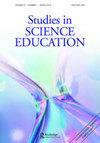The application of the microgenetic method to studies of learning in science education: characteristics of published studies, methodological issues and recommendations for future research
IF 9.9
2区 教育学
Q1 EDUCATION & EDUCATIONAL RESEARCH
引用次数: 21
Abstract
Abstract This paper examines the role of the microgenetic method in science education. The microgenetic method is a technique for exploring the progression of learning in detail through repeated, high-frequency observations of a learner’s ‘performance’ in some activity. Existing microgenetic studies in science education are analysed. This leads to an examination of five significant methodological issues in microgenetic research. Firstly, qualitative and/or quantitative approaches to data collection and analysis within the microgenetic approach are considered and a case is made for the appropriateness of qualitative microgenetic research. Secondly, it is argued that researchers may define static intervals, periods within which (for methodological purposes) change is assumed not to occur, when reporting microgenetic studies. Thirdly, researchers should consider providing justifications for their choice of sampling rate with reference to the rate of change of the phenomenon they are studying. Fourthly, the difficulty of distinguishing conceptual change from the existence of multiple understandings is highlighted. Finally, the nature of sequences of repeated measures in microgenetic studies is considered. It is argued that different methodological approaches are suitable for microgenetic studies of different phenomena and a list of guidelines for the use of the microgenetic method in small-scale, qualitatively analysed studies in science education is proposed.微遗传学方法在科学教育学习研究中的应用:已发表研究的特点、方法问题和对未来研究的建议
摘要本文探讨了微遗传学方法在科学教育中的作用。微遗传方法是一种通过反复、高频地观察学习者在某些活动中的“表现”来详细探索学习过程的技术。对目前科学教育中的微遗传学研究进行了分析。这导致了对微遗传学研究中五个重要方法问题的检查。首先,考虑了微遗传学方法中数据收集和分析的定性和/或定量方法,并为定性微遗传学研究的适当性提出了一个案例。其次,有人认为,在报告微遗传学研究时,研究人员可以定义静态间隔,即(出于方法学目的)假设不发生变化的时间段。第三,研究人员应该考虑根据他们所研究的现象的变化率为他们选择的抽样率提供理由。第四,强调了区分概念变化与多重理解存在的困难。最后,考虑了微遗传学研究中重复测量序列的性质。有人认为,不同的方法方法适用于不同现象的微遗传学研究,并提出了在科学教育的小规模定性分析研究中使用微遗传学方法的指导方针清单。
本文章由计算机程序翻译,如有差异,请以英文原文为准。
求助全文
约1分钟内获得全文
求助全文
来源期刊

Studies in Science Education
EDUCATION, SCIENTIFIC DISCIPLINES-
CiteScore
15.30
自引率
2.00%
发文量
7
审稿时长
>12 weeks
期刊介绍:
The central aim of Studies in Science Education is to publish review articles of the highest quality which provide analytical syntheses of research into key topics and issues in science education. In addressing this aim, the Editor and Editorial Advisory Board, are guided by a commitment to:
maintaining and developing the highest standards of scholarship associated with the journal;
publishing articles from as wide a range of authors as possible, in relation both to professional background and country of origin;
publishing articles which serve both to consolidate and reflect upon existing fields of study and to promote new areas for research activity.
Studies in Science Education will be of interest to all those involved in science education including: science education researchers, doctoral and masters students; science teachers at elementary, high school and university levels; science education policy makers; science education curriculum developers and text book writers.
Articles featured in Studies in Science Education have been made available either following invitation from the Editor or through potential contributors offering pieces. Given the substantial nature of the review articles, the Editor is willing to give informal feedback on the suitability of proposals though all contributions, whether invited or not, are subject to full peer review. A limited number of books of special interest and concern to those involved in science education are normally reviewed in each volume.
 求助内容:
求助内容: 应助结果提醒方式:
应助结果提醒方式:


